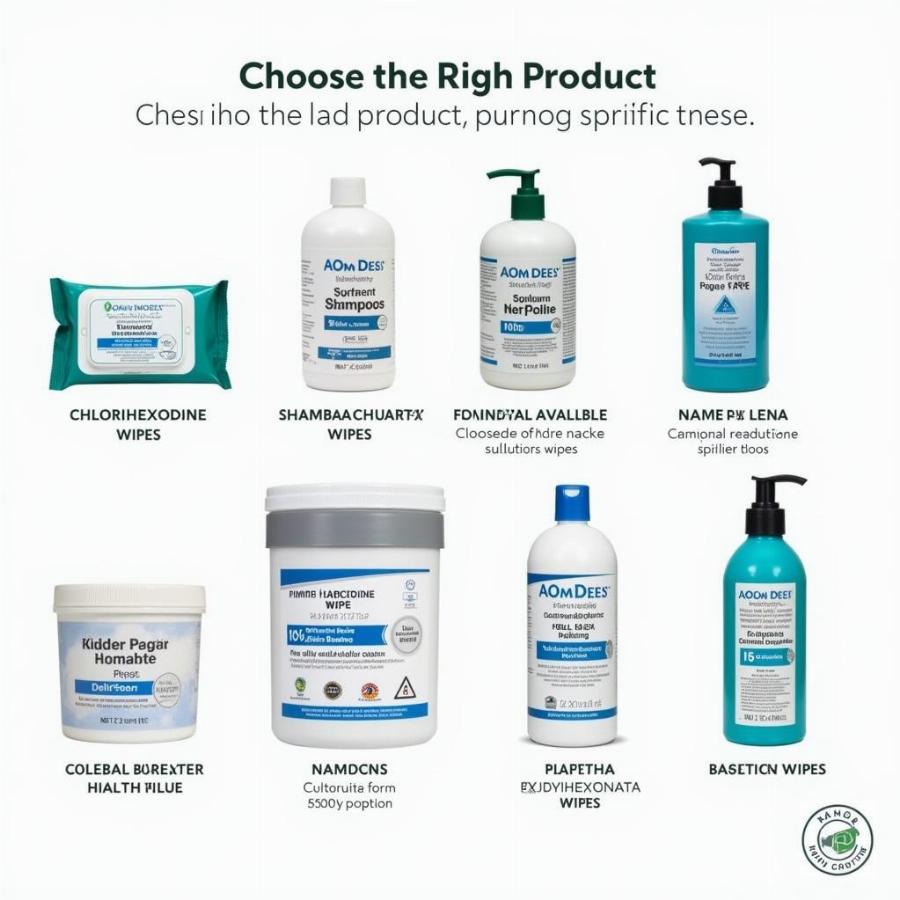Chlorhexidine for dogs wipes are a common tool in a pet owner’s arsenal, used for everything from cleaning minor wounds to routine hygiene. But are they always the right choice? This comprehensive guide dives deep into the world of chlorhexidine wipes for dogs, covering their uses, benefits, potential risks, and everything in between. We’ll explore when they’re beneficial, when they’re unnecessary, and how to use them safely and effectively to ensure your furry friend stays healthy and happy.
Understanding Chlorhexidine and Its Uses in Dogs
Chlorhexidine is an antiseptic and disinfectant commonly used in both human and veterinary medicine. It works by disrupting the cell membranes of bacteria, fungi, and some viruses, effectively killing or inhibiting their growth. In dogs, chlorhexidine is often found in wipes, shampoos, and solutions, making it a versatile option for various skin and wound care needs. Its broad-spectrum antimicrobial activity makes it effective against a wide range of pathogens, helping to prevent infections and promote healing.
When are Chlorhexidine Wipes Beneficial for Dogs?
Chlorhexidine wipes for dogs are particularly useful for:
- Cleaning minor wounds and abrasions: They help remove debris and bacteria, reducing the risk of infection.
- Managing skin infections: Chlorhexidine can help control the spread of bacterial and fungal infections like pyoderma and ringworm.
- Hot spots: The antiseptic properties of chlorhexidine can soothe irritated skin and prevent secondary infections in hot spots.
- Post-surgical care: Cleaning surgical sites with chlorhexidine wipes can minimize the risk of post-operative infections.
- Routine hygiene: Some owners use chlorhexidine wipes for general cleaning, especially for breeds prone to skin fold infections.
Potential Risks and Precautions When Using Chlorhexidine Wipes on Dogs
While generally safe, chlorhexidine wipes can pose some risks if used improperly:
- Irritation: Some dogs may experience skin irritation or allergic reactions to chlorhexidine.
- Toxicity if ingested: Chlorhexidine can be toxic if ingested, so prevent your dog from licking the treated area.
- Ototoxicity: Avoid using chlorhexidine wipes near the ears, as it can cause hearing problems if it enters the ear canal.
- Eye irritation: Keep chlorhexidine away from the eyes.
 Safe usage of chlorhexidine wipes
Safe usage of chlorhexidine wipes
How to Use Chlorhexidine for Dogs Wipes Safely and Effectively
Follow these steps for safe and effective use:
- Consult your veterinarian: Before using chlorhexidine wipes, consult your vet to ensure they are appropriate for your dog’s specific condition.
- Clean the affected area: Gently wipe the area with a fresh chlorhexidine wipe, removing any debris or dirt.
- Allow to air dry: Do not rinse or wipe off the chlorhexidine. Let it air dry to maximize its effectiveness.
- Monitor for any adverse reactions: Watch for any signs of skin irritation, redness, or discomfort.
- Follow your veterinarian’s instructions: Adhere to the recommended frequency and duration of use.
Alternatives to Chlorhexidine Wipes
Several alternatives to chlorhexidine wipes are available:
- Antiseptic sprays: These can be useful for hard-to-reach areas.
- Medicated shampoos: For managing widespread skin infections.
- Natural remedies: Some owners prefer natural options like coconut oil or aloe vera for minor skin issues. dog teeth cleaning wipes are a good alternative for dental hygiene.
Can I use human chlorhexidine wipes on my dog?
It’s generally best to use veterinary-formulated chlorhexidine wipes on dogs. Human products may contain different concentrations or inactive ingredients that could be harmful to pets. Always consult your vet before using any human medication on your dog. chlorhexidine for dog offers specifically formulated options.
Conclusion
Chlorhexidine for dogs wipes can be a valuable tool for maintaining your dog’s health, but they should be used responsibly and under the guidance of a veterinarian. Understanding the benefits, risks, and proper usage will help you make informed decisions about your pet’s care, ensuring they receive the most effective and safe treatment. Always remember to consult your vet before starting any new treatment, including the use of chlorhexidine wipes. Considering a medical kit for dogs can also be helpful for a variety of situations.
FAQ
- How often can I use chlorhexidine wipes on my dog? Follow your veterinarian’s instructions. Overuse can lead to skin irritation.
- Can I use chlorhexidine wipes on my puppy? Consult your vet before using them on puppies, as their skin is more sensitive.
- What should I do if my dog licks the treated area? Contact your veterinarian immediately.
- Are chlorhexidine wipes safe for use around the eyes? No, avoid contact with the eyes. bactine on dogs provides more information on alternative options for eye care.
- Can I use chlorhexidine wipes on open wounds? Yes, they are effective for cleaning minor wounds. blue lotion for dogs might be a better alternative for specific wound types.
Beaut Dogs is your trusted resource for all things canine, offering expert advice and comprehensive information on dog breeds, care, and well-being. For personalized guidance on using chlorhexidine for dogs wipes or any other pet health concerns, please email us at [email protected]. We’re here to help you provide the best care for your furry companion. Visit Beaut Dogs today to learn more!